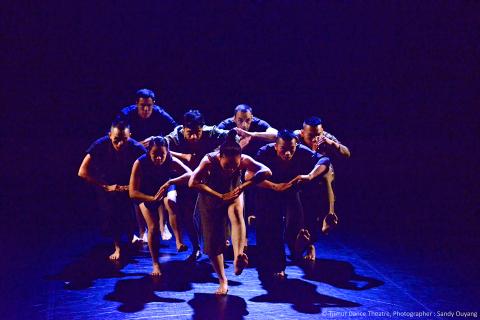The biennial Pulima Art Festival (Pulima藝術節2016), a showcase for contemporary indigenous art and cultures, has moved south for its third installment after the first two were held in Taipei.
The festival, which opened on Saturday last week, runs through Feb. 5, with a multitude of dance, music and theater productions as well as art exhibitions and forums with contributions from Taiwan’s 14 Aboriginal communities, Austronesian-speaking areas and other indigenous peoples.
Organizers say the festival, the largest Aboriginal contemporary art event in the nation, is an important platform to showcase the power of Aboriginal cultural communication and to expose Aboriginal children to arts and cultural performances that are rooted in their own cultures.

Photo courtesy of Tjimur Dance Theatre
“Pulima” is a Paiwan word meaning creative or highly skilled people.
This year’s theme is “O loma no adingo,” which means “Home, where the spirit dwells.” The idea is to encourage young Aboriginals, especially artists, to have the courage to explore their own life experiences.
The festival, and the attendant Pulima Art Prize, is supported by the Indigenous Peoples Cultural Foundation, which took its initial inspiration for the event from the Edinburgh Art Festival and the Festival d’Avignon in France.
Groups that are members of the Taiwan Indigenous Performing Arts Connection, including the Pingtung County-based Tjimur Dance Theatre (蒂摩爾古薪舞集) and Taitung-based Bulareyaung Dance Company (布拉瑞揚舞團) are among those giving shows, along with the Atamira Dance Company and Black Grace from New Zealand and B2M (Bathurst to Melville), a seven-member band from the Tiwi Islands in Australia.
Tjimur and Black Grace will be performing their coproduction, 2_Gather (在一起), which premiered at the Taipei Arts Festival in September, this weekend.
The Hualien County-based Langasan Theatre (冉而山劇場), whose members are artists, farmers, blue-collar workers and academics from the Amis, Rukai and Sakizaya communities as well as Hakka and Hoklo, will present its new production, Mayaw Kakalawan (星星 — 颯旮啦旦老) for three shows at the Pier-2 Arts Center on Nov. 19 and Nov. 20
The festival events are being held around the city, at the Dadong Culture and Art Center, the Kaohsiung Experimental Theater, Pier-2 Arts Center and the Kaohsiung Museum of Fine Arts.
More information is available at the festival’s Web site (www.pulima.com.tw), though it is predominately in Mandarin.

April 28 to May 4 During the Japanese colonial era, a city’s “first” high school typically served Japanese students, while Taiwanese attended the “second” high school. Only in Taichung was this reversed. That’s because when Taichung First High School opened its doors on May 1, 1915 to serve Taiwanese students who were previously barred from secondary education, it was the only high school in town. Former principal Hideo Azukisawa threatened to quit when the government in 1922 attempted to transfer the “first” designation to a new local high school for Japanese students, leading to this unusual situation. Prior to the Taichung First

When the South Vietnamese capital of Saigon fell to the North Vietnamese forces 50 years ago this week, it prompted a mass exodus of some 2 million people — hundreds of thousands fleeing perilously on small boats across open water to escape the communist regime. Many ultimately settled in Southern California’s Orange County in an area now known as “Little Saigon,” not far from Marine Corps Base Camp Pendleton, where the first refugees were airlifted upon reaching the US. The diaspora now also has significant populations in Virginia, Texas and Washington state, as well as in countries including France and Australia.

On April 17, Chinese Nationalist Party (KMT) Chairman Eric Chu (朱立倫) launched a bold campaign to revive and revitalize the KMT base by calling for an impromptu rally at the Taipei prosecutor’s offices to protest recent arrests of KMT recall campaigners over allegations of forgery and fraud involving signatures of dead voters. The protest had no time to apply for permits and was illegal, but that played into the sense of opposition grievance at alleged weaponization of the judiciary by the Democratic Progressive Party (DPP) to “annihilate” the opposition parties. Blamed for faltering recall campaigns and faced with a KMT chair

Article 2 of the Additional Articles of the Constitution of the Republic of China (中華民國憲法增修條文) stipulates that upon a vote of no confidence in the premier, the president can dissolve the legislature within 10 days. If the legislature is dissolved, a new legislative election must be held within 60 days, and the legislators’ terms will then be reckoned from that election. Two weeks ago Taipei Mayor Chiang Wan-an (蔣萬安) of the Chinese Nationalist Party (KMT) proposed that the legislature hold a vote of no confidence in the premier and dare the president to dissolve the legislature. The legislature is currently controlled